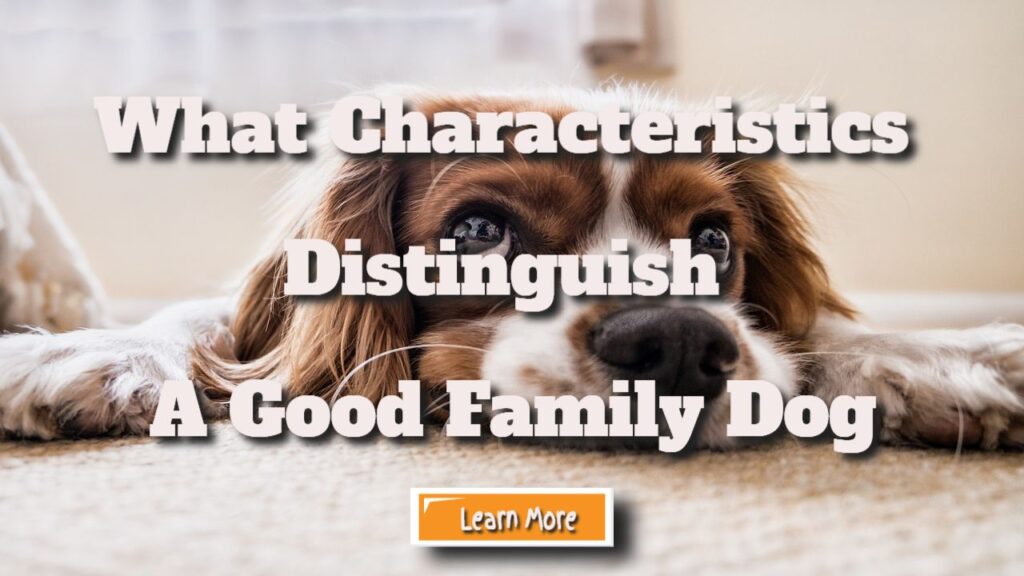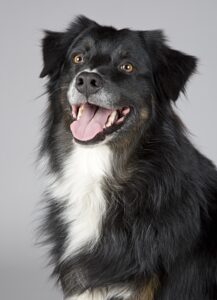What Characteristics Distinguish A Good Family Dog?
What Characteristics Distinguish a Good Family Dog?: Dr Holly Putnam, a veterinarian and past board member of the Association of Shelter Veterinarians, suggests considering the dog’s size, your family’s lifestyle and the energy level best suited.
These three characteristics can assist you in selecting a suitable family dog, whether purebred or mixed breed:
Temperament: The personality of the dog. Choosing someone with a positive attitude will help. A calm dog, for example, can form strong bonds with your children and be a wonderful friend.
Size: The size of a dog does not indicate whether or not it is suitable for children. Size should be considered alongside temperament and energy level. Some larger dogs are gentler, while others are more active. “For example, if you have a family with small children, a large, hyperactive dog could knock the children over,” explains Dr Putnam.
It is entirely up to you and your family to live at whatever energy level they prefer. Be realistic about the lifestyle you can provide for a dog who needs more exercise than the average. If you do not respond to a dog’s demands, his excess energy may lead to later behavioural issues. “If you’re a runner looking for a companion, a docile Basset Hound may not be the best choice,” Dr Putnam says.
Setting up a Meet and Greet
Before deciding, meet potential new pets to get a sense of their temperament and energy level.
Dr Putnam advises keeping an eye on the dog’s interactions with children, the elderly, and the senile.
Dr Putnam also recommends watching the dog’s body language:
Some dogs develop feelings for what they believe to be theirs. When tiny toddlers pick up anything, including the dog’s toy or food bowl, this can lead to a dangerous situation.
5 Things to Consider Before Getting a Family Dog
Along with getting to know the dog, you should speak with employees at the shelter or rescue to learn more about it and its likes and dislikes. Here are five questions to ask potential family dogs:
Is everyone in the house at ease around the dog? Some dogs get along with everyone in the family, while others prefer adults or only one gender.
What is the dog’s energy level? You may want a dog to accompany you and your family on long walks or one you can carry in your arms most of the time.
What kind of ongoing care will the dog need? Is it a long-haired dog that needs to be groomed regularly or an elderly dog that may need more frequent vet visits?
Which age group do you prefer? Do you want a puppy who will need a lot of training but will get along with everyone, or do you want an older dog who is toilet trained but maybe a little reserved and will need some time to adjust to your home routine?
Here is a list of the best family dogs.
While these dogs have characteristics that make them excellent family dogs, you will still need to regularly work on their training and socialisation to ensure they become good canine citizens.
1. Mixed breeds are my top choice!
Don’t dismiss mixed breeds even if your family is primarily interested in purebred dogs. Mixed breeds frequently combine the best qualities of two (or more!) great breeds into a single dog.
Employees at the shelter or sanctuary can tell you more about the dog’s personality and habits because they care for it all day.
2. Retrieving Golden Retriever
The Golden Retriever is a confident, intelligent, friendly, and loyal dog. The Golden Retriever is an excellent companion for children because it is neither aggressive nor fearful.
Although the breed requires a lot of exercises, it enjoys playing (fetch games are its favourite activity, for example, your Golden might enjoy playing with Frisbees).
Because the Golden Retriever is frequently kind and obedient, your children will immediately fall in love with it.
Brushing their beautiful golden coat twice a week is necessary for proper maintenance.
3. Labrador Retriever
Labrador Retrievers are popular for a reason: they are playful, patient, loving, protective, and dependable. Another benefit is that Labradors are intelligent and can be well-trained.
They necessitate a lot of activity (and they enjoy swimming! ), so make sure your family is up for the challenge. Make sure your children have enough room to run and play.
Black Labs, Chocolate Labs, and Yellow Labs are popular breeds because they excel at endurance, strength, and obedience.
These gentle canines get along with most other animals and people. They must be combed once weekly due to their short coats to stay clean and healthy. However, Labradors shed frequently, so be prepared to remove their hair regularly.
4. poodles
This elegant and dignified dog breed is gentle, loyal, and rarely irritable or dull.
Poodles come in miniature and regular sizes, allowing you to choose the size that best fits your lifestyle. They are ideal for children with allergies because they shed so little hair.
Each breed has distinct preferences. For example, the Standard Poodle is obedient, intelligent, lively, and adventurous. Despite their shyness around strangers, they get along well with their friends and children.
On the other hand, Miniature Poodles are loyal to one person while getting along well with other dogs and children. They are astute, responsive, obedient, and entertaining.
Poodle coats, regardless of breed, must be groomed regularly.
5 Irish Setter
The Irish Setter is a cheerful and energetic dog with a red coat who enjoys being around people and playing with children.
This breed is so attached to its family that it avoids being alone and performs best when surrounded by loved ones. (Here are some easy ways to prevent separation anxiety in your dog.)
The Irish Setter is an intelligent and trainable companion who enjoys greeting visitors and is ideal for people with a yard.
Because Irish Setters have longer coats, they must be brushed and combed regularly to prevent hair mats.
6 Vizsla
While this dog breed is not suitable for everyone due to its need for regular activity. It’s one of the best dog breeds for active families with teenagers or adults.
The breed is also devoted, confident, and bright. Vizslas form strong bonds with family members and learn new tricks quickly.
Labrador and Newfoundland
The Newfoundland, also known as “nature’s babysitter,” is one of the most intelligent dog breeds in the world, loving and protecting children.
This breed resembles Mother Teresa in gentleness, compassion, and patience. This enormous, adorable dog will quickly win over younger and older family members.
The Newfoundland is ideal for a family with lots of open space, and despite their tendency to drool and shed a lot, they should not be left outside in the garden (no dog should). Their long coat necessitates regular brushing and maintenance.
The Newfoundland is an excellent swimmer who has rescued people in distress. They are easily trained and task-oriented, so don’t hesitate to offer them incentives requiring extra effort.
They require less maintenance due to their short coats.
8 Bull Terrier
Despite its unfortunate reputation as an aggressive animal, the Bull Terrier was created to be a dog that gets along with people of all ages, from the elderly to the young.
Remember that your Bull Terrier is prone to mischief, especially around other small animals and dogs. To avoid complications, keep your pet mentally and physically busy every day.
A Bull Terrier’s short, flat coat requires little maintenance, and the breed is happiest when given access to a yard to play in.
Beagle
The Beagle is an excellent choice for families due to its small size (it can be carried easily!) and peaceful temperament.
Beagles were initially kept as hunting dogs, and their strong frame ensures they are never too tired to play. This breed is ideal for active families with children who enjoy hiking and exploring the outdoors.
The Beagle is an intelligent, friendly, and cheerful dog who gets along well with other pets (aside from a bit of hunting here and there). They must be brushed and bathed regularly because their hair sheds.
Bulldog 10
The Bulldog is a durable, kid-friendly option. It will not, however, be recognised as the “most energetic dog.”
The Bulldog can live in either large or small houses.
Most Bulldogs are also friendly with visitors and get along well with other pets, making them an excellent addition to a busy, social family. Because of their small size, they are suitable for both large homes and small apartments.
If you want to get a bulldog, remember that their clamped jaws necessitate extra caution when brushing their teeth and that they frequently pant, snore, and drool.
Wipe the folds around their tails and facial creases to prevent dirt buildup. Their fur, on the other hand, requires almost no maintenance.
Understanding what makes a dog kid-friendly will make choosing a new dog for your family much more accessible.
The post What Characteristics Distinguish A Good Family Dog? appeared first on https://gqcentral.co.uk







Comments are closed